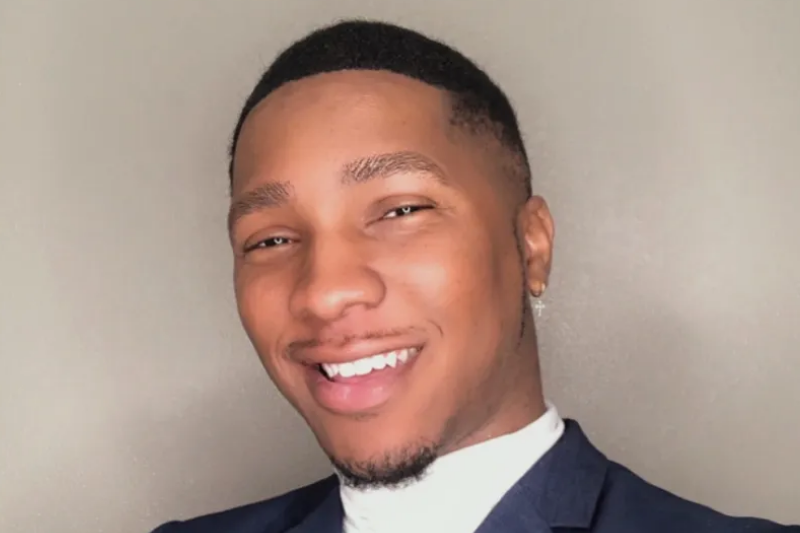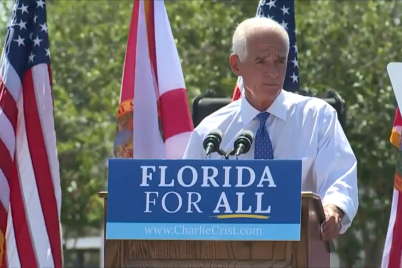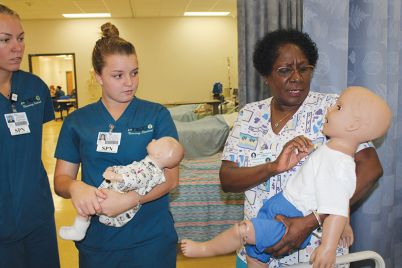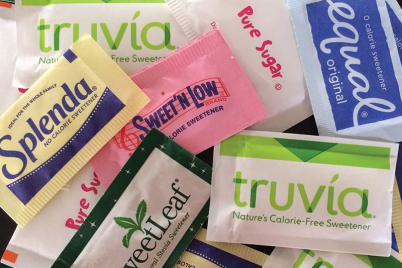Rocky Butler, founder and CEO of 9 Colors Initiative, aims to fight the misinformation proliferating the Black community about HIV/AIDS. He’s creating innovative ways to educate people through digital media rather than traditional educational methods.
BY HEAVEN TAYLOR-WYNN, Contributor
ST. PETERSBURG — On a typical weekday evening, Rocky Butler can be found seated at his desk face to face with his MacBook, its screen glowing on his face.
Though his neighbors will have gone to bed for the night, Butler works late hours drafting emails and planning programs, all for the love of his community.
Despite his upbringing in a traditional southern home where weekly church outings were the norm, Butler is tapped into the LGBTQ+ community and is actively building more inclusive spaces for queer people of color.
The 30-year-old St. Petersburg native is focused diligently on planning one of his largest programs to date, a World AIDS Day charity gala for his organization 9 Colors Initiative. It partners with organizations to create diverse and inclusive programming. Thus far, he’s worked with Metro Inclusive Health, AHF, and the Department of Health.
Although Butler loves this work, this was not something he planned for.
“Being born and raised here in St. Pete for my childhood and most of my adult life, I come from a family that’s pretty sheltered and strict,” he said.
He was raised in the south, went to church, and was taught being gay was a sin. In his pre-adolescence, he didn’t have a firm sense of what it meant to be queer. But by the time he was 15 years old, he attended his first St. Pete Pride; the only problem was the attendees didn’t look like him.
When he was 18, he moved to New York City to chase his modeling dreams.
“[In New York] I got my first real experience with seeing people that look like me that I can identify with, being Black and Brown and same-gender loving,” he said.
Health concerns brought him back home to be closer to family when he was 24 years old. He enrolled in St. Petersburg College and founded the organization that would become the 9 Colors Initiative.
At that point, he realized how different the experience was living as a queer person in New York City versus St. Petersburg.
When a friend had a traumatic health experience and had nowhere to turn, he was able to connect them with resources, but a large issue persisted.
“When getting him the help, more often than not, he felt uncomfortable,” Butler said.
According to Butler, one of the biggest issues with care retention is making people feel comfortable. This issue is magnified when patients are people of color and members of the LGBTQ+ community. Some of the issues plaguing care with these patients include poor case management, misconceptions about pain tolerance, and lack of cultural competency.
Butler believes there should be more resources to help Black and Brown queer people feel included and accepted in the Tampa Bay area. Following the experience with his friend, the 9 Colors Initiative focused on connecting people with care, particularly those who were trans, queer, HIV positive, experiencing homelessness, and suffering from addiction.
As the program director for The Weekly Challenger’s Pinellas Ending the HIV Epidemic (#PinellasEHE) campaign, Butler will translate his experience working with people in this community to model inclusivity.
According to Pinellas EHE, in 2019, Black people in Pinellas were 5.9 times more likely to be diagnosed with HIV than white people. Butler said one of the top causes of the higher rates of HIV/AIDS in Black communities is misinformation, and there’s one false claim, in particular, he said he still hears daily.
“A lot of the heterosexual community thinks it’s a gay disease. It’s not.”
To fight the misinformation proliferating the community, Butler is creating innovative ways to educate people through digital media rather than traditional educational methods.
“The moment people perceive they’re trying to be taught something, they’re not interested,” he said.
Butler will focus on three specific campaign areas: launching a TikTok campaign for The Weekly Challenger, hosting barbershop talks, and hosting a St. Pete Drag Race competition.
“We will be doing about eight TikToks centered around social issues,” he said.
He plans to address relationship trauma, mental health, and childhood trauma in these upcoming original videos.
“All of these [are] things we deal with in everyday situations that cause us to be in situations where we may be put at risk,” Butler said, speaking about young Black queer folks. Planning for the TikTok videos has already begun, and they will be published on The Challenger’s account in the coming weeks.
Barbershop talks, the second #PinellasEHE initiative, is a video series featuring open conversations about real-life topics that Butler said should be happening in barbershops.
“We’ll have queer and straight people in the space to get different perspectives,” he said. “We want to dig past just the surface. We’ll compare queer relationships to heterosexual relationships.”
Butler said there tends to be an assumption from gay men that straight men have it easier in relationships and vice versa. This series will debunk myths through honest conversations and exploration. Ultimately the goal is to leave with a deeper understanding of the struggles that men from different experiences go through.
The third initiative that Butler will work on is the St. Pete Drag Race competition.
“I realized there aren’t a lot of Black and Brown entertainers [in this area], and the ones that are, feel like they don’t have a place or a space, and it’s hard to get into the industry here because there are gatekeepers,” Butler asserted.
The competition, which is developed in partnership with the Banyan Tree Project, creates a space for drag entertainers to grow their platform and earn cash prizes. It will take place June 19. St. Pete Pride’s board has been strategically invited to help entertainers grow their platforms and get booked the following weekend for Pride.
Though World AIDS Day is several months away, Butler will undoubtedly have his hands full managing these initiatives to help St. Pete become more inclusive for queer people of color. Plus, he said people still reach out seeking his help.
“I get Facebook messages about getting into care,” he said. He also described how sometimes people walk up to him in person and seek out his services. They’ll say, “Hey, I got your number from such and such, and I need help getting into care.”
As he finalizes his audience, budget, vendors and venue for his gala, he’ll be hard at work educating Challenger readers about how they can be more inclusive allies to their queer neighbors.
“It’s honestly because I want change for where I live. I want to feel included and accepted.”








